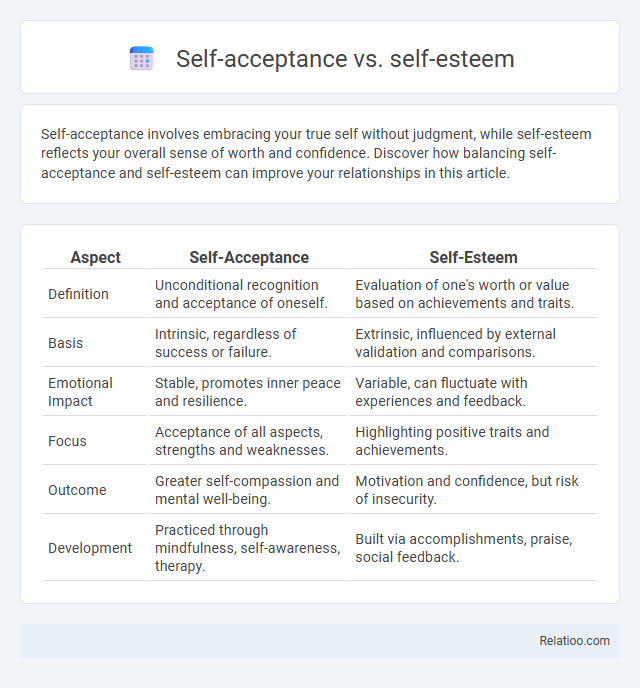Self-acceptance involves embracing your true self without judgment, while self-esteem reflects your overall sense of worth and confidence. Discover how balancing self-acceptance and self-esteem can improve your relationships in this article.
Table of Comparison
| Aspect | Self-Acceptance | Self-Esteem |
|---|---|---|
| Definition | Unconditional recognition and acceptance of oneself. | Evaluation of one's worth or value based on achievements and traits. |
| Basis | Intrinsic, regardless of success or failure. | Extrinsic, influenced by external validation and comparisons. |
| Emotional Impact | Stable, promotes inner peace and resilience. | Variable, can fluctuate with experiences and feedback. |
| Focus | Acceptance of all aspects, strengths and weaknesses. | Highlighting positive traits and achievements. |
| Outcome | Greater self-compassion and mental well-being. | Motivation and confidence, but risk of insecurity. |
| Development | Practiced through mindfulness, self-awareness, therapy. | Built via accomplishments, praise, social feedback. |
Understanding Self-Acceptance: What It Really Means
Self-acceptance involves embracing all aspects of oneself, including flaws and imperfections, without harsh judgment or denial. It differs from self-esteem, which is based on evaluating one's worth and often fluctuates with achievements and external validation. Understanding self-acceptance means recognizing it as an unconditional inner state that fosters resilience and genuine well-being beyond external successes or failures.
Defining Self-Esteem: The Basics Explained
Self-esteem refers to an individual's overall subjective evaluation of their own worth, encompassing confidence, pride, and self-respect. It is shaped by personal beliefs and experiences, influencing motivation, behavior, and emotional well-being. Unlike self-acceptance, which involves recognizing and embracing all aspects of oneself without judgment, self-esteem focuses on valuing oneself based on perceived achievements and qualities.
Key Differences Between Self-Acceptance and Self-Esteem
Self-acceptance involves embracing your entire self, including flaws and imperfections, without judgment, while self-esteem reflects the value you place on yourself based on achievements or external validation. Your self-esteem can fluctuate depending on successes or failures, but self-acceptance remains steady as an unconditional acknowledgment of your worth. Understanding these key differences empowers you to cultivate a balanced mindset that nurtures both inner peace and confidence.
How Self-Acceptance Impacts Mental Health
Self-acceptance, a fundamental component of mental health, involves embracing all aspects of oneself without undue self-criticism, fostering emotional resilience and reducing symptoms of anxiety and depression. Unlike self-esteem, which fluctuates based on achievements and external validation, self-acceptance provides a stable foundation for well-being by promoting unconditional self-compassion. Studies show that higher self-acceptance correlates with lower stress levels and improved psychological adjustment, highlighting its crucial role in sustaining mental health.
The Role of Self-Esteem in Personal Development
Self-esteem plays a crucial role in personal development by influencing motivation, resilience, and overall mental health. High self-esteem fosters confidence and promotes a positive self-image, enabling individuals to face challenges and pursue goals effectively. While self-acceptance involves embracing one's flaws and strengths unconditionally, self-esteem reflects the evaluative aspect of how much value one places on oneself, shaping decision-making and interpersonal relationships.
Common Misconceptions About Self-Acceptance and Self-Esteem
Self-acceptance involves embracing all aspects of yourself without judgment, whereas self-esteem refers to evaluating your worth based on achievements or external validation. A common misconception about self-acceptance is that it means complacency or ignoring personal growth, while self-esteem is often misunderstood as constant confidence rather than fluctuating feelings tied to success and failure. Your focus on developing true self-acceptance helps create a stable foundation for genuine self-esteem, free from dependence on external approval.
Building Self-Acceptance: Practical Strategies
Building self-acceptance involves embracing your true self without judgment, recognizing your strengths and limitations with compassion. Techniques such as mindfulness meditation, positive affirmations, and setting realistic goals can foster a healthier relationship with yourself. Your journey toward self-acceptance supports emotional resilience and enhances overall well-being more sustainably than solely focusing on self-esteem or self-confidence.
Boosting Self-Esteem: Tips and Techniques
Boosting self-esteem involves recognizing personal strengths and accomplishments while embracing self-acceptance, which fosters a realistic and compassionate self-view. Techniques such as positive affirmations, mindfulness practices, and goal setting can enhance self-esteem by reducing negative self-talk and promoting confidence. Cultivating self-acceptance allows individuals to improve resilience and maintain a stable sense of worth, essential components in the development of healthy self-esteem.
Self-Acceptance vs Self-Esteem: Which Matters More?
Self-acceptance involves recognizing and embracing your true self without judgment, while self-esteem is based on evaluating your worth through achievements and external approval. Your mental well-being benefits more from self-acceptance, as it fosters unconditional self-love and resilience regardless of circumstances. Prioritizing self-acceptance over fluctuating self-esteem provides a stable foundation for personal growth and emotional health.
Integrating Self-Acceptance and Self-Esteem for Lasting Well-being
Integrating self-acceptance and self-esteem enhances lasting well-being by balancing unconditional self-compassion with a positive self-evaluation based on your achievements and values. Self-acceptance involves embracing all aspects of yourself without judgment, while self-esteem reflects your confidence and sense of worth derived from accomplishments. Cultivating both allows you to maintain resilience during challenges and fosters a stable, healthy self-concept.

Infographic: Self-acceptance vs Self-esteem
 relatioo.com
relatioo.com